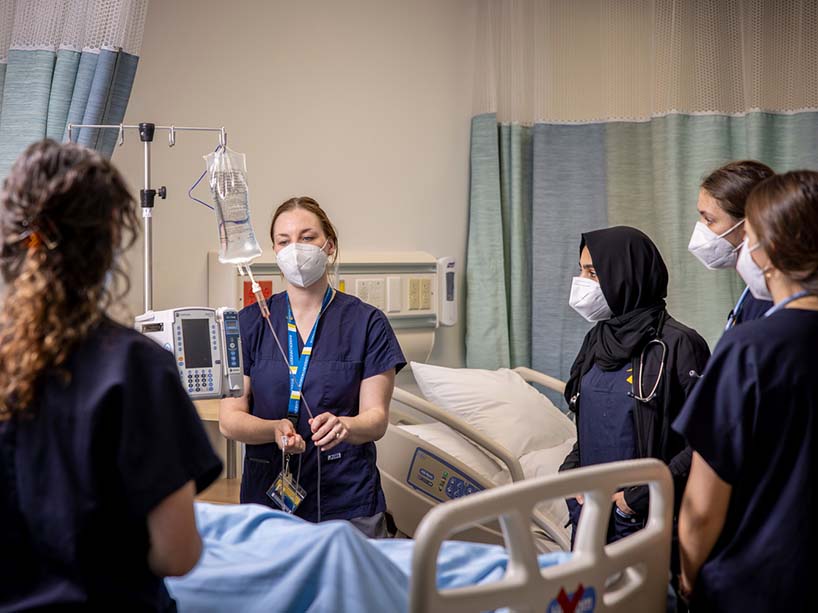How TMU is preparing nursing students for a challenging working environment

Nursing students are preparing to enter a work environment that has changed since the COVD-19 pandemic. Researchers from TMU are working to make sure they are prepared. Photo credit: Jesse Milns
Canada’s health-care system reached a boiling point in the summer as emergency rooms across the country closed their doors to patients due to lack of available staff. This issue has made international news, with outlets like the New York Times putting a spotlight on the dire need for health-care workers (external link) .
Many will argue that this is not a new issue, but that the COVID-19 pandemic has aggravated an ongoing issue in health care: nurses are overworked and when facing burnout, more experienced nurses are choosing retirement more than ever. In fact, according to CBC (external link) , more than 34,000 health-care workers left the industry between May and September, 2022. This is, in large part, due to the high retirement rates of nurses.
Through research into nursing work environments, Toronto Metropolitan University (TMU) professors are aware of the issues nurses face. They get feedback from students who are in the workforce and adapt their teaching to accommodate the new kind of working environment.
Innovative practices and real-life experiences
Professor Sue Bookey-Bassett says given the current attention the health-care profession is getting, it’s easy to get caught up in the doom and gloom. She researches a number of interprofessional elements of nursing, including nursing work environments and capacity building for the nursing workforce. She is quick to reiterate that students are learning innovative practices in nursing and these creative learning tools help prepare them for the workforce.
“We bring a sense of reality to our classroom discussions,” she said. “We bring theory and practice together and develop critical thinking skills.”
Students are learning in the Daphne Cockwell School of Nursing’s (DCSN) state-of-the-art nursing simulation lab that replicates a real hospital environment. Students are placed in many different health-care settings which prepares them for various scenarios when they reach the workforce.
Bookey-Bassett says that the simulation lab allows teachers to adapt the scenarios. For example, in a post-COVID-19 environment, the simulation lab can help students learn about working in crisis situations so they gain the skills needed to manage in challenging times, like pandemics.
TMU nursing students have opportunities to gain valuable experience through externships, where they are hired as students. Several students in the 2022 nursing cohort have accepted full-time positions as a result of their externships.
Training for the Canadian landscape
A common proposed solution for the health-care staffing shortage in Canada is to employ more internationally educated nurses and TMU offers two options through The Chang School to help bridge education requirements and get more trained nurses into the workforce.
“Everyone is looking for creative solutions to move nurses into practice as quickly as possible,” said professor Elaine Santa Mina.
One solution is the post-diploma nursing degree program which gives registered practical nurses and internationally educated nurses the chance to upgrade their diplomas to a bachelor degree. This option is particularly good for working nurses, so they can study part-time.
“The part-time program is ideal for many internationally educated nurses because many of them have to work at the same time to support their families,” says Santa Mina.
Santa Mina is also part of the Ontario Internationally Educated Nurses Course Consortium (OIENCC), a group of Canadian institutions, including TMU via The Chang School, that helps address nursing shortages.
Funded by the Ontario government, the OIENCC gives internationally trained nurses the credentials they need to work in the province. Because most students have their bachelor degree from their country of origin, the programming offered is different from the post-diploma program. The consortium gives them the competency training to be a registered nurse in Ontario.
Santa Mina says internationally educated nurses are mature and offer a great level of experience to the province, country and nursing community.
“They represent the diversity of the province,” she said. “They bring maturity of perspective, maturity of problem solving, they have tremendous perseverance.”
Adaptable learning environments
Professor Sherry Espin and Bookey-Bassett are among a larger group of researchers from the Daphne Cockwell School of Nursing (DCSN) collecting information about the experience of nurses during the pandemic. Espin and Bookey-Bassett teach in both the master’s of nursing program and the post-diploma program, where students learn and work simultaneously.
“We were really curious about their unique experience of being students in placement and also working as nurses during COVID-19,” she said.
Several themes emerged during the research study. Initially students felt a call to duty, they felt compelled to do what was expected of them as health-care providers. Over the course of the pandemic, Espin, Bookey-Bassett and several of their DCSN colleagues began to hear about students’ feelings of stress, lack of respect and a real shift of perspective of how the public viewed nursing.
Both say that this level of feedback from the frontlines helps keep the nursing program current.
“It enables us to act quickly,” said Bookey-Bassett. “We are able to make changes to the content we deliver, and how we deliver it.”
Professors are sensitive to what working students are going through and work to adapt the ways they teach to accommodate their schedules. This includes recorded lectures and online course content so that students who can’t come to class due to work, still get the chance to learn.
Bookey-Bassett and Espin will continue their research with students on the frontlines, turning their focus to workplace environments, recruitment and retention. Their research has important implications for how they, as educators, adapt to the current environment.
“We need to get back to an environment where nurses feel valued and respected,” said Bookey-Bassett.
